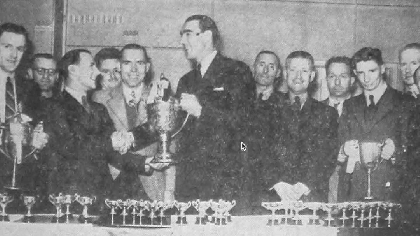
Towering above the prize winners at Glossop and District Amateur Football League’s annual dinner in June 1950 is the man they called ‘Big Swifty’.
Manchester City and England goalkeeper Frank Swift was one of the country’s most popular and greatest players.
He is pictured above at a works canteen in Glossop.
The room in High Street West where employees of Francis Sumner’s cotton mill ate their meals was hardly the most glamorous place Frank had ever been, but by all accounts, he was happy to be invited to present the winner of the league’s 1949-50 season with their awards.
In those days footballers and former players rarely refused invitations to such events, and probably were only paid expenses by their host.
Frank wasn’t only a big man in size; he had a big heart and was a fan-favourite.
The dangers of smoking weren’t publicised in the 1950s, with many health experts believing it was a way of aiding relaxation and reducing stress and depressions.
So perhaps it wasn’t such a big surprise when the Mayor of Glossop, Cllr. Mrs M.L. Casey, made what now would be an impossible decision.
She was chairing a town council meeting that had already gone on for more than two hours and so gave members permission to light up their cigarettes and pipes.
The Glossop Chronicle was reporting that plans for the Mottram bypass (yes councillors were discussing the relief road 75 years ago) were having an effect on introducing safety measures on one of Glossop’s biggest bottleneck junctions.
Everyone agreed that a footbridge was needed at Woolley Bridge over the river Etherow, but with the start of the by-pass still unclear, there would be a delay in building it.
Shouts from children playing near a lodge in Old Glossop that someone was in the water were heard by a group of workmen, who rushed to rescue an 80-year-old woman who lived at nearby Castle Hill.
She was taken by ambulance to Wood’s Hospital less than a mile away where her condition was described as ‘satisfactory’.
Glossop Town Council was busy making plans to build badly-needed homes for the first time since the end of the Second World War, but with money still in short supply, local authorities had to count the pennies.
There was talk of making the homes all electric to reduce costs, but some councillors were saying gas should be piped in as many people preferred it when it came to cooking.
Over to cricket, and Glossop were looking to halt a disastrous run of Lancashire and Cheshire Cricket League defeats at Unsworth, but the match was washed out when the rain came.
Maybe the weather saved the North Road side who were bowled out for 92, with Unsworth three runs for the loss of one wicket when the game was abandoned.
Rain was also stopping play in the Glossop and District Cricket League, with most games ending prematurely.
All first division fixtures were registered draws, most of them after only one side had the chance to bat.
Things were slightly better in division two where Hollingworth beat Ashton Trafalgar, Tintwistle came out on top against Hadfield St Andrews and Broadbottom lost at Hyde.
They were a hardier lot in the Glossop Sunday School League, where top of the table Hadfield St. Charles made it five wins on the bounce by easily beating Shrewsbury Street and Mount Pleasant who occupied second spot accounting for near neighbours Princess Street.
Whatever the weather, there was no stopping the road racing cyclists of Glossop Velo, and in particular, their rising young star Clifford Sparkes.
We previously reported here how the 17-year-old had beaten a top-class field to out-sprint rivals to win a top Manchester road race.
Now, seven days later, Cliffe, as he liked to be called, was finishing second in a National Junior Road Racing Championship event in Wolverhampton.




